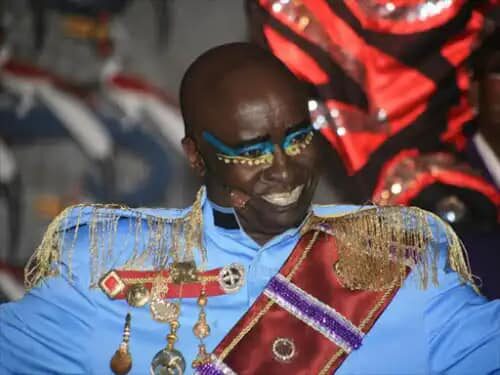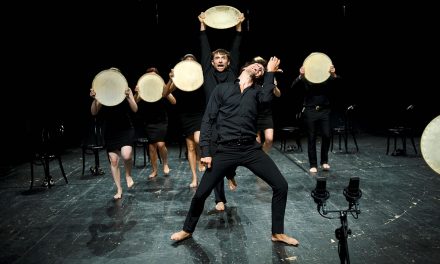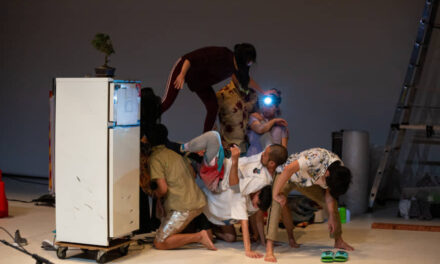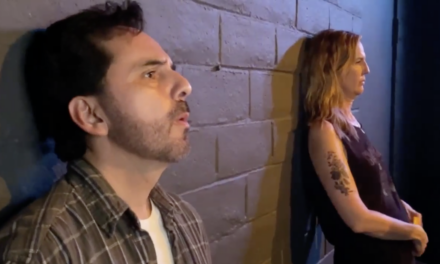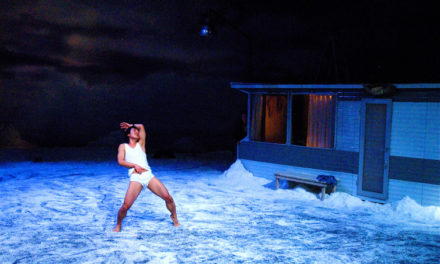The inaugural NYrobi Book Fest (25th – 26th June 2021) played host to the launch of a book of six plays by veteran Kenyan thespian, teacher, and playwright John Sibi-Okumu. NYrobi Book Fest is an initiative of the Alliance Française de Nairobi. It was the first major in-person literary event since early 2020 when the corona virus pandemic ravaged the world.
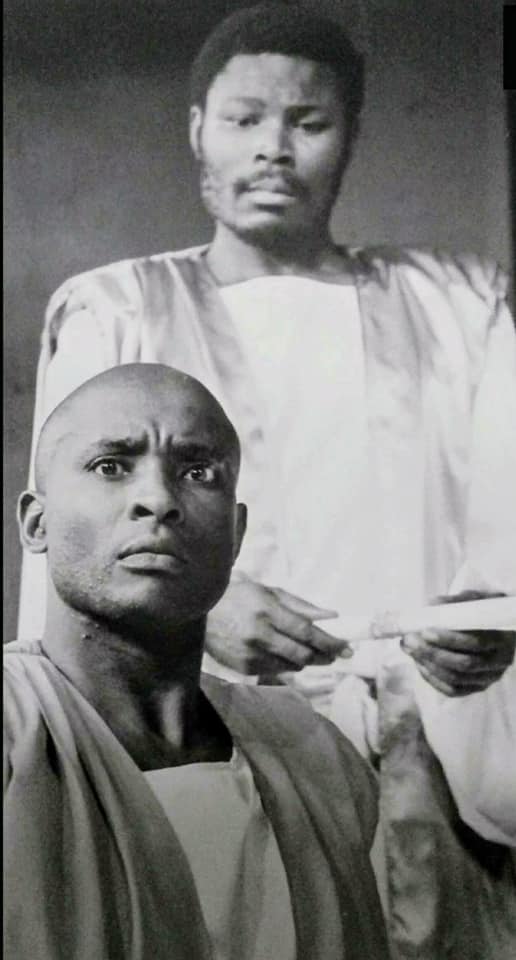
Portrait of the artist as a young man: John Sibi-Okumu (front) in Antigone (1990) (Photo: Courtesy)
In accordance with COVID-19 protocols, the ceremony was kept short and the audience was socially (actually that should be ‘physically’, but we’ll let it pass) distanced.
CAREER
JSO (as he is fondly known in the theatre fraternity) is best known as a long-time stage/film actor and TV show host. For many years, he also taught French in a Nairobi school and is still referred to as “mwalimu” (teacher) by many acquaintances. In his address at NYrobi Fest, JSO gave some background to his work as a playwright:
“The year 2005 saw the publication of Role Play, the first of the play in the collection, by Mvule Publishers, headed by Mr. Barrack Muluka. I was glad that it had gained some international attention at the time. And the journalist who wrote in the magazine Newsweek (said): “Fifty is a bit old to be breaking into a career, especially in Kenya, where the average life expectancy is forty-three. But playwright John Sibi-Okumu is doing just that.” So standing here before you, 16 years later, I must say that I am very lucky to be alive…
…The first thing I did upon leaving school is to play ‘Romeo’ in a Black-and-White production of Romeo and Juliet…And this was big deal in those days. In 1973, having a Black guy giving a passionate kiss to a White girl was a big deal. But I seem to remember the she and I quite enjoyed it!…In Joe de Graft’s Muntu, I played the ‘First Son’…We did A Midsummer Night’s Dream at the Phoenix (Players)…We did a play in French at the Alliance Française where Iplayed a character called ‘Louis’. In 1990, Echoes of Silence – John Ruganda. Antigone at the Phoenix Players…These were good roles for an actor to play because they allow you to encompass the worst possible things that a human being can live through. And you come away from these productions transformed. Because you can’t quite see the world the same way again.”
THE BOOK
Titled Collected Plays (2004-2014), the new book contains six stand-alone plays:
- Role Play
- Minister, Karibu!
- Meetings
- Elements
- Kaggia
- Dinner at her Excellency’s
All the plays were written in English, except for Elements which was a one-woman show in French. In addition to English, Minister, Karibu! was also performed in the Gikuyu language, translated by Tash Mitambo.
In a review for the Business Daily, long-time arts journalist Magaretta wa Gacheru wrote:
“With the publication of Sibi Okumu’s Collected Plays 2004-2014, I propose the author be known as Kenya’s Unsung Playwright. But that title might also be rejected by those who don’t agree or say Sibi Okumu is known for being a thespian, but more for having been an actor on television and film than the stage.
He might even be better known as a director of shows like Eric Wainaina’s off-Broadway musical Mo’ Faya. And among Kenyans, he might be best known for being the former TV interviewer of famous men on The Summit.
In fact, until the recent publication of his plays by Jahazi Press, his most enduring renown could be as a remarkable French teacher and interpreter at UN forums.
But it’s the publication of those six major plays which provide evidence that Sibi deserves a pride of place in Kenya’s and Africa’s literary world as a writer of deep insight into the history and everyday life of the people of Kenya.”
Collected Plays 2004-2014 is available at Prestige Bookshop, Nairobi, and retails for Kshs 1,500 (USD$ 15.00).
LAUNCH
Speaking at the launch the author said:
“Of the plays, I will give you a very small summary, a one-liner, of what you will find in these collected plays. I travelled to the States in the 1980’s and I managed to see James Earl Jones playing in Fences. And I managed to see the work of an American writer called August Wilson. He was an African-American writer who had taken the history of his people, decade by decade, from the 1900’s – in 10-year cycles – and made plays out of them…And I sort of said, “Ping! – I could do that, too.”…We have in essence what could be the most beautiful country in the world, we have great weather, we have friendlier people than I have met travelling elsewhere, and every seven years or so, somebody gives us an order and we sharpen our machetes and putting things alight! For those of us of a certain sensibility, this is stupid and what can we do about it? I knew I didn’t want to be the MP of my rural home area but I could write plays…
People said to me: “You’ve been in 40 plays, you’ve been in film. The last time we had anything coming out of the region was Betrayal in the City in 1975, The Trial of Dedan Kimathi in 1975…Script a play and put your name on it.” And we had Role Play. The story of Jonathan Juma, born in 1930, who confronts the anxieties of Kenya’s founding fathers. Followed by the comedy Minister, Karibu!. A common crook, the spitting image of a powerful politician; he and his sidekick use the confusion caused to their advantage. In Meetings, a string of events with their origin within the attempted 1982 coup in Kenya all lead to make-or-break situation so many years later. In Kaggia, a biographical play, the focus in on the politician Bildad Kaggia – he of the Kapenguria Six – and the tensions brought by his alternative vision for Kenya. In Elements, a female author of Indian-Kenyan heritage during the construction of the Kenya-Uganda railway reflects, in a monologue, on the notion of identity. And in Dinner at Her Excellency’s, a play for radio, a group of Kenyan intellectuals are invited by an East European ambassador to give their views on the draft 2010 Constitution of Kenya…
But in order to do these things, you’ve got to create a story. You’re not pontificating, you’re not proselytizing; you’re telling a story.”
This post was written by the author in their personal capacity.The opinions expressed in this article are the author’s own and do not reflect the view of The Theatre Times, their staff or collaborators.
This post was written by Alexander Nderitu.
The views expressed here belong to the author and do not necessarily reflect our views and opinions.

